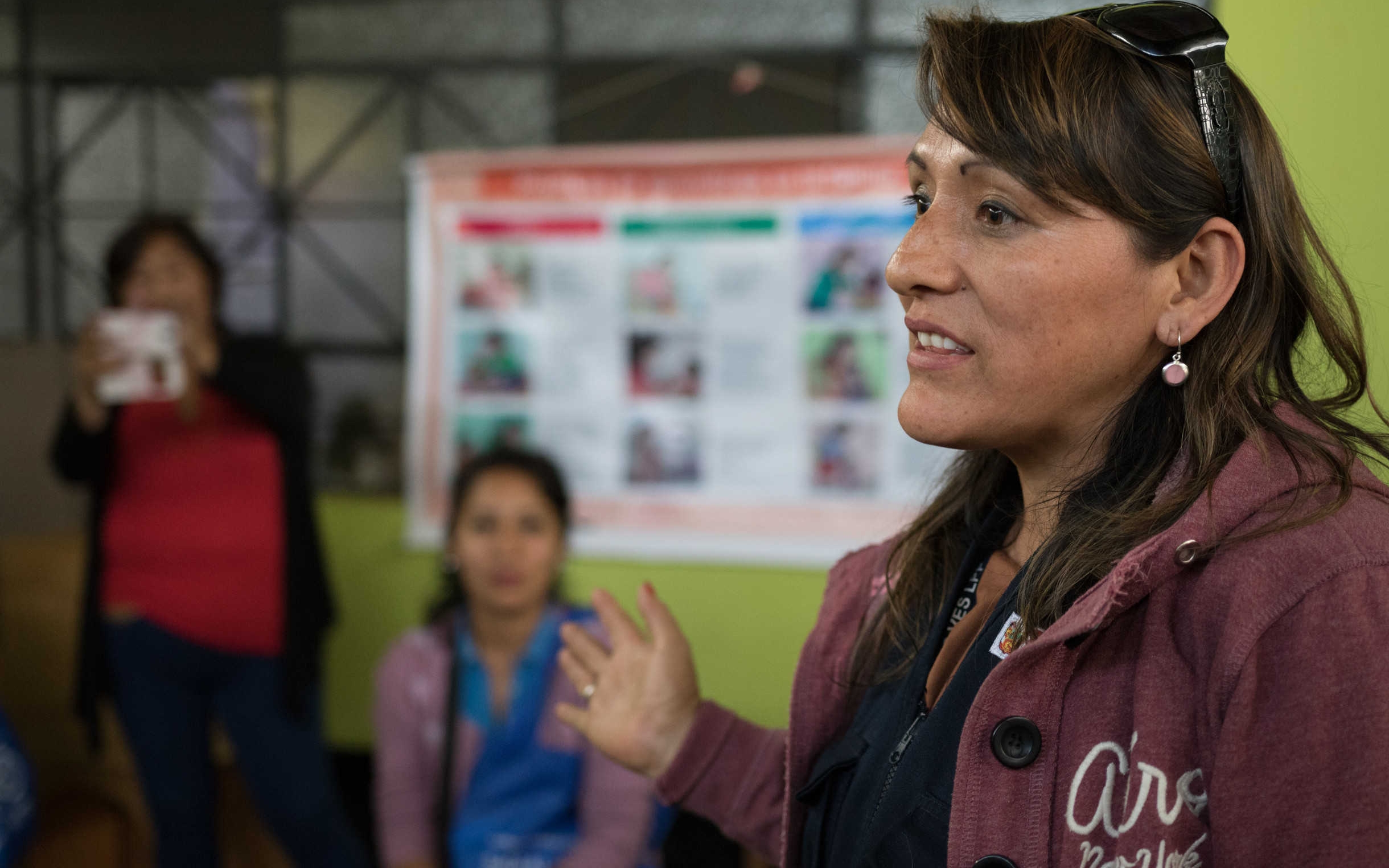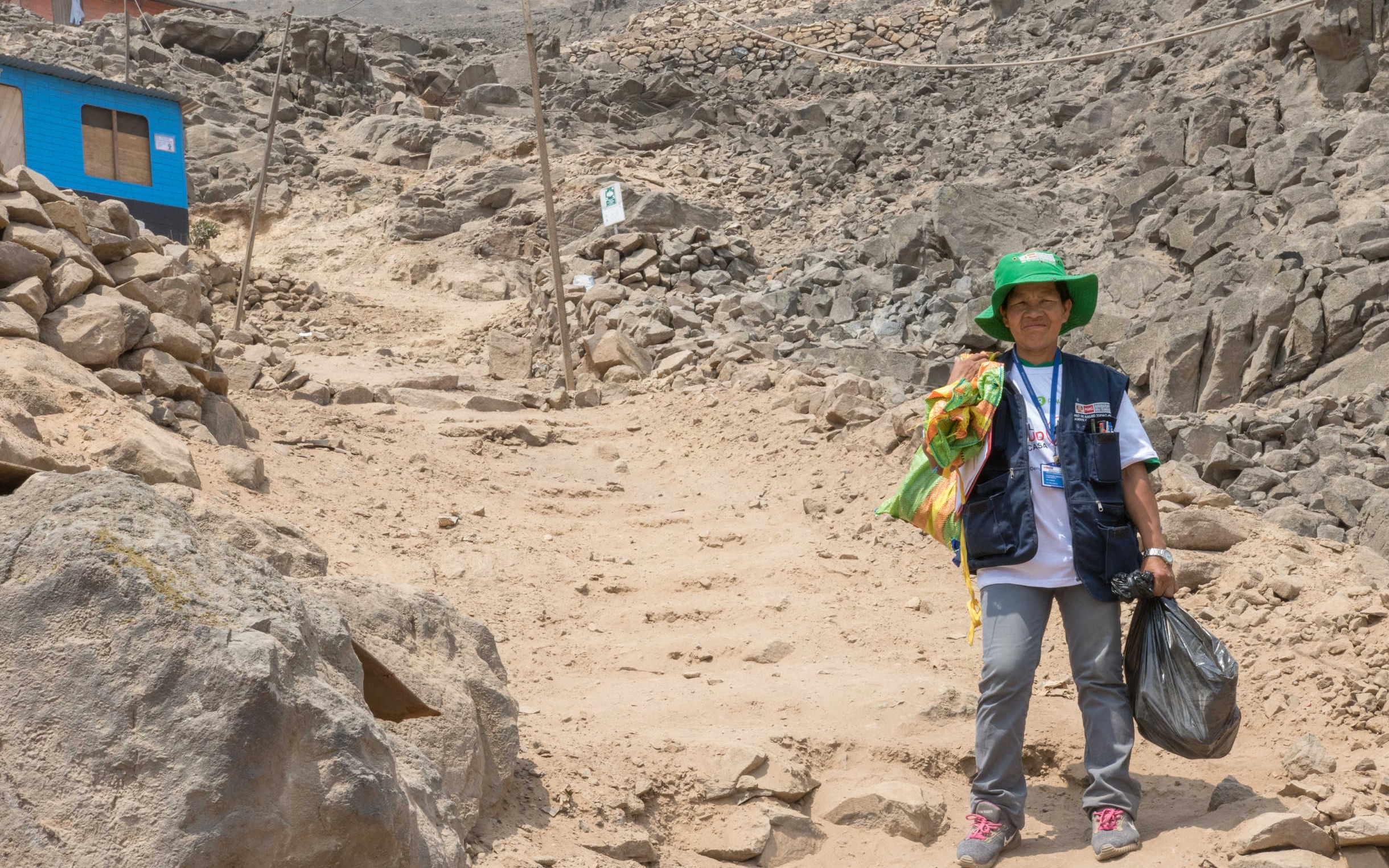In the shanty towns that have sprung up outside Lima, Peru, residents have strong allies against epidemics: dedicated local agencies and health workers.
In the community of El Roble, not far from Lima, Peru, clean water running from a tap is an almost unimaginable luxury. Here, residents—many of them migrants from poor regions of the country—haul 20-liter buckets up a steep, gravelly mountainside to their houses.
On a dusty day in November, resident Maria Valdivieso heaved a bucket onto her shoulder and began to climb. “By the time you reach your house,” she said, “you are dead.”
And you are poorer than before: water here costs residents at least five times what they would pay in the city of Lima.
What’s more, once you’ve poured the water into storage barrels in your home, it becomes a health risk to your family, as standing water is the perfect breeding ground for mosquitoes that carry dangerous diseases like dengue, Zika, and chikungunya.
That’s where Oxfam partner PREDES comes in. PREDES has been providing training and supplies to local health workers in vulnerable communities like El Roble to help residents ward off outbreaks of mosquito-borne disease. Meanwhile, the agency is urging the Lima authorities to provide running water to more informal settlements like this one to ease both hardship and health risks.
When someone talks to you face to face, you understand

That afternoon, four health promoters greeted visitors in a tiny community center perched on a steep hillside. They had spent the morning walking door to door—handing out soap, cleaning brushes, and barrel lids; examining water containers for mosquito larvae and demonstrating how to scrub them away; and discussing all the whys and hows of preventing mosquitoes from multiplying.
If they were tired from hiking the rugged terrain, they didn’t show it or complain.
“I became a promoter because I wanted to help people who are illiterate and who have few resources. I’ve been doing it since 2013, and I like it very much,” said Bersi Ochavano. “In the past,” she added, “people didn’t always let us in, but now they do.”
Her sister Jenny was once one of the people who didn’t welcome visits from health workers. “The first thing I did when I met a health promoter was slam the door in her face,” she said. The women laughed. Not only has Jenny herself become a promoter, but Ester Polo, the woman she refused to speak to, is now her friend and colleague—and was sitting beside her that day.
“When we go house to house, we can see that people have learned about dengue,” said Ochavano, “and they have confidence in their knowledge.”
You don’t stroll around this neighborhood: you climb. At times you need to use your hands to do it. But you don’t have to climb far to learn that residents appreciate the work of these health workers.
“I feel confident now that I can avoid dengue and Zika,” said Gabriel Jimenez, who lives in a tiny home built on a homemade terrace. “Before the promoters worked with us, I didn’t know enough.”
“The promoters have been very useful, especially for our children,” said neighbor Mariela Estrada. “It can be hard to identify a serious illness, but when someone comes and talks to you face to face, you understand.”
Mosquitoes don’t pick who they sting
About 25 miles south of El Roble, a similar program is underway in the coastal settlement of Las Brisas. Across a small bay lie the ancient ruins of a ceremonial center dedicated to the god Pachacamac, but you won’t find Las Brisas on anyone’s tourist roadmap. This is a poor community first settled by squatters, but it’s more established than El Roble and has recently achieved a crucial milestone in development: its residents have running water. The service isn’t entirely reliable, though, so people continue to store water in tanks and barrels.
As in El Roble, the promoters here are committed local people like Luzmila Vasquez, an elderly mother of eight children. For 25 years she has worked as a health volunteer, helping her neighbors battle everything from TB to cholera to AIDS. “I wanted to find a way to give back to my community,” she said. Now she is on the front lines of a campaign against mosquito-borne disease organized by PREDES and the Lima authorities, knocking on doors each day to share messages about prevention.
Nelly Montes Hilario, a government coordinator for this work, joined her on a recent afternoon. “PREDES has done a lot to strengthen our programs and promoters,” she said. Spotting a water tank with a broken cover, she broke off the conversation and peered inside.
“You need to put sand in that tank or remove it,” she told the owner when he answered a knock on his door. He explained that he now has running water and no longer uses it so feels safe, but she quickly challenged his faulty reasoning. “Mosquitoes don’t pick who they sting,” she said. “This tank poses a risk to the neighborhood.”
“We focus on prevention,” she explained as she resumed her tour of the neighborhood. “It is much more difficult and expensive to treat illnesses than to prevent them.” But her real motivation doesn’t have to do with budgets. “I care about the health of our people. If they get sick with dengue or Zika, the consequences could be serious. They may not be able to work, and some will die. I worry about that.”
Local humanitarians: a study in commitment

When local and national actors like PREDES and the government authorities join forces, it can be a powerful collaboration that saves lives when disasters—from earthquakes to epidemics—threaten poor communities. But it’s easy for initiatives like this to fall under the radar of international agencies and donors, and all too often that leaves the more local agencies desperately short of funds. Oxfam is advocating around the world for more investment in local humanitarian leaders. Unlike many international disaster responders, they have easy access to hard-hit communities, they understand local languages and cultures, and—if they can find the resources—they’ll be there for the long haul.
On the windy mountainside in El Roble, there was something else on display that day that many local humanitarians have in abundance: commitment.
“To combat diseases like dengue,” said Jenny Ochavano, “I will climb to the last house on the highest hill.”
